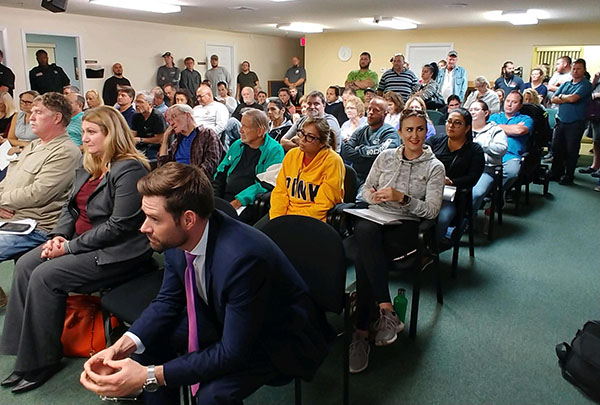
More than 100 Acreage truckers, friends of truckers and others who were angry about the new Palm Beach County vehicle code prohibiting heavy trucks and semis parking in view on their property showed up at the Wednesday, Nov. 20 meeting of the Indian Trail Improvement District Board of Supervisors.
Several residents said they moved to The Acreage because they had trucks, but at least eight area residents have been cited by county code inspectors in recent months for illegally parked vehicles since the code started being enforced in January.
The ITID supervisors provided a memo from ITID Attorney Frank Palin regarding a proposed amendment to the county’s unified land development code to allow heavy-duty truck parking accessory to residences in The Acreage.
The memo explained that ITID has been asked by County Commissioner Melissa McKinlay to comment on the possible impact on district roads if the county amends its ULDC to allow heavy-duty truck parking on residential lots in The Acreage.
The memo noted that The Acreage is largely zoned AR (agricultural residential), but the typical Acreage lot size is 1.25 acres, which is much smaller than current minimum lot sizes in the AR zone, which range from 2.5 to 5 acres. The ULDC was amended in 2018 to address controversies arising from the parking of commercial trucks in the AR zone.
ITID President Betty Argue noted that the topic of the vehicle code got on the agenda after residents started being cited.
“As you know, Indian Trail is an improvement district, and it’s not responsible for code and land use. However, the county has been changing some of the ULDC requirements and, in essence, changing the rules that apply to our community,” Argue said. “Prior to the amendment, you were allowed two of those semi-tractor-trailers on your property, and the county changed it without notifying our community. Indian Trail was not there. We did not request it be changed, but they changed it. They said you are no longer allowed to have any.”
Argue said her personal opinion was that the county was taking away property rights and added that she resented an offer made by the county to amend the ordinance to allow one semi-tractor-trailer on Acreage properties.
“We were not consulted in the first place,” she said. “We did not have a problem in the first place.”
Argue said she had records of her talking to county officials protesting the county code amendment before it was enacted, but she was largely ignored, except a county official telling her they could not have one set of rules for one area but not for another.
She told residents who had been cited and owned property before the ordinance was enacted that they should tell the magistrate that they had been denied the right to have semis on their property.
“The only opinion we should be providing to the county is that the rights should be restored back to what it was,” Argue said, adding that the only part of the memo before the board that evening was about the semis. “It does not chime in on the rest of the changes that were taken out of the ULDC relating to your recreational vehicles and all other kinds of vehicles and trailers.”
Supervisor Joni Martin said she had met with McKinlay and eight residents who were cited for having semi-trucks parked on their properties. “They had requested a meeting; we had requested a meeting. We all met together with zoning and building and code enforcement, and we said that things had been changed without us being aware of it,” she said. “These residents have semi-trucks that they use for their livelihood, and they moved into the area. They are trying to work with the county to get at least one of the trucks back.”
ITID Attorney Mary Viator said she attended the meeting with county officials at Martin’s request. “Commissioner McKinlay was very gracious in assembling the group and staff dealing with these issues and heard the comments from these eight people who have code enforcement issues going on,” Viator said. “They did acknowledge that there had been changes in the ULDC, and as a result, some of these individuals were being cited. She is trying to work with staff to come up with a reasonable compromise.”
Viator said that McKinlay indicated she would be willing to support the change in the ULDC to allow one large vehicle on Acreage properties. “To address the immediate needs of these individuals, she would make that recommendation,” she said. “Her one request is that she wanted to make sure that she had comments and direction from our Indian Trail board that there would not be adverse impacts to our roads.”
Michael Ingram said he has lived in Palm Beach County for more than 50 years and watched it grow.
“What has occurred is the county has developed around these communities,” he said. “I spent the last 20 years driving a truck and had a 48-foot tractor-trailer. I lived in a neighborhood that wasn’t concerned, but one day a county code enforcement guy drove by and said, ‘You can’t park there.’ I saw the writing on the wall, and I moved to Loxahatchee.”
None of his neighbors had an issue until a new neighbor moved in and called code enforcement.







